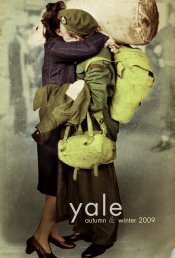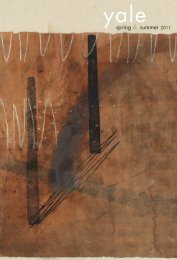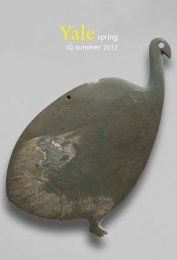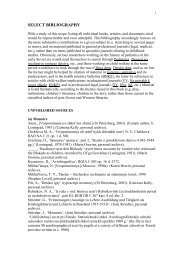View & Download - Yale University Press
View & Download - Yale University Press
View & Download - Yale University Press
Create successful ePaper yourself
Turn your PDF publications into a flip-book with our unique Google optimized e-Paper software.
72 Politics & Philosophy<br />
Philosophy of Dreams<br />
Christoph Türcke<br />
Translated by Susan H. Gillespie<br />
Why has mankind developed so<br />
differently from other animals? How<br />
and why did language, culture,<br />
religion and the arts come into being?<br />
Christoph Türcke offers a new answer<br />
to these questions by scrutinising the<br />
phenomenon of the dream, using it as<br />
a psychic fossil connecting us with<br />
our Stone Age ancestors. Provocatively, he argues that both<br />
civilisation and mental processes are the results of a compulsion<br />
to repeat early traumas, one to which hallucination,<br />
imagination, mind, spirit and God all developed in response.<br />
Until the beginning of the modern era, repetition was<br />
synonymous with de-escalation and calming down. Then,<br />
automatic machinery gave rise to a new type of repetition,<br />
whose effects are permanent alarm and distraction. The new<br />
global forces of distraction, Türcke argues, are producing a<br />
specific kind of stress that breaks down the barriers between<br />
dreams and waking consciousness. Türcke’s essay ends with a<br />
sobering indictment of this psychic deregulation and the social<br />
and economic deregulations that have accompanied it.<br />
Christoph Türcke is professor of philosophy and religion at<br />
the Academy of Fine Arts in Leipzig.<br />
November 304 pp. 234x156mm.<br />
HB ISBN 978-0-300-18840-0 £20.00*<br />
Translation rights: Beck Verlag, Munich<br />
Civil Disobedience<br />
An American Tradition<br />
Lewis Perry<br />
The American tradition of civil<br />
disobedience stretches back to pre-<br />
Revolutionary War days. Tracing the<br />
origins of the notion of civil<br />
disobedience to 18th-century<br />
evangelicalism and republicanism,<br />
Lewis Perry discusses how the<br />
tradition took shape in the actions<br />
of black and white abolitionists and antiwar protesters in the<br />
decades leading to the Civil War, then found new expression<br />
in post-Civil War campaigns for women’s equality, temperance<br />
and labour reform. Gaining new strength and clarity from<br />
explorations of Thoreau’s essays and Gandhi’s teachings, the<br />
tradition persisted through the Second World War, grew<br />
stronger during the decades of civil rights protest and antiwar<br />
struggles, and has been adopted more recently by antiabortion<br />
groups, advocates of same-sex marriage, opponents of<br />
nuclear power and many others. Perry clarifies some of the<br />
central implications of civil disobedience that have become<br />
blurred in recent times and highlights the dilemmas faced by<br />
those who choose to violate laws in the name of a higher<br />
morality.<br />
Lewis Perry is John Francis Bannon, S.J., Professor Emeritus,<br />
Department of History, Saint Louis <strong>University</strong>.<br />
November 384 pp. 234x156mm.<br />
HB ISBN 978-0-300-12459-0 £20.00<br />
A Theory of Militant<br />
Democracy<br />
The Ethics of Combatting Political<br />
Extremism<br />
Alexander S. Kirshner<br />
How should pro-democratic forces<br />
safeguard representative government<br />
from anti-democratic forces? By<br />
granting rights of participation to<br />
groups that do not share democratic<br />
values, democracies may endanger the<br />
very rights they have granted; but<br />
denying these rights may also<br />
undermine democratic values.<br />
Alexander Kirshner offers a set of<br />
principles for determining when one<br />
may reasonably refuse rights of<br />
participation, and he defends this<br />
theory through real-world examples,<br />
ranging from the far-right British<br />
Nationalist Party to Turkey’s Islamist<br />
Welfare Party to America’s Democratic<br />
Party during Reconstruction.<br />
Alexander S. Kirshner is an assistant<br />
professor of political science at Duke<br />
<strong>University</strong> and a senior fellow at the<br />
Kenan Institute for Ethics.<br />
February 160 pp. 234x156mm.<br />
PB ISBN 978-0-300-18824-0 £25.00<br />
Adam Smith’s Pluralism<br />
Rationality, Education,<br />
and the Moral Sentiments<br />
Jack Russell Weinstein<br />
In this thought-provoking study,<br />
Jack Russell Weinstein suggests the<br />
foundations of liberalism can be found<br />
in the writings of Adam Smith<br />
(1723–1790), a pioneer of modern<br />
economic theory and major figure in<br />
the Scottish Enlightenment. While<br />
offering an interpretive methodology for<br />
approaching Smith’s two major works,<br />
The Theory of Moral Sentiments and<br />
The Wealth of Nations, Weinstein argues<br />
against the libertarian interpretation of<br />
Smith, emphasising his philosophies of<br />
education and rationality. Weinstein<br />
also demonstrates that Smith should be<br />
recognised for a prescient theory of<br />
pluralism that prefigures current<br />
theories of cultural diversity.<br />
Jack Russell Weinstein is Professor of<br />
Philosophy and Director of the Institute<br />
for Philosophy in Public Life at the<br />
<strong>University</strong> of North Dakota.<br />
October 360 pp. 234x156mm.<br />
HB ISBN 978-0-300-16253-0 £45.00<br />
The Warburg Years<br />
(1919–1933)<br />
Essays on Language, Art, Myth,<br />
and Technology<br />
Ernst Cassirer • Translated and with<br />
an introduction by S. G. Lofts<br />
with A. Calcagno<br />
The Jewish German philosopher<br />
Ernst Cassirer was one of the leading<br />
proponents of the Marburg school of<br />
neo-Kantianism. The essays in this<br />
volume provide a window into Cassirer’s<br />
discovery of the symbolic nature of<br />
human existence – the fact that our<br />
entire emotional and intellectual life is<br />
configured and formed through the<br />
originary expressive power of word and<br />
image, that it is in and through the<br />
symbolic cultural systems of language,<br />
art, myth, religion, science and<br />
technology that human life realises itself<br />
and attains not only its form, its<br />
visibility, but also its reality.<br />
S. G. Lofts and A. Calcagno are<br />
professors of philosophy at King’s<br />
<strong>University</strong> College at Western<br />
<strong>University</strong>, London, Canada.<br />
January 384 pp. 210x140mm.<br />
HB ISBN 978-0-300-10819-4 £35.00












